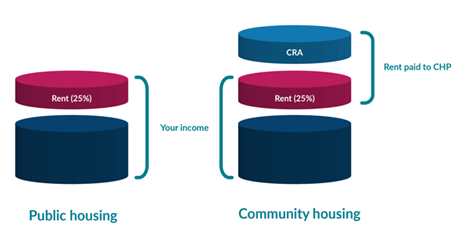Transferring to community housing
Territory Families, Housing and Communities is transferring the property and tenancy management of some public housing properties to Community Housing Providers.
If your property is being considered and you have questions, you can:
- read the information below, or
- contact your local housing office:
- Darwin - 08 8999 8814
- Palmerston - 08 8999 4767
- Alice Springs - 08 8951 5497
Learn more about the Northern Territory Government’s commitment to community housing in the NT community housing growth strategy 2022-32 PDF (1.6 MB).
Information sessions
Details about future information sessions will be posted here and delivered to tenants by post.
Community housing providers
- Are non-government organisations that provide social and affordable housing to people on very low to moderate incomes.
- Are tightly regulated by the National Regulatory System for Community Housing and can access revenue streams not available to government, which they reinvest into more housing and better services for tenants.
You can view a list of community housing providers in the Northern Territory.
With a community housing provider as your landlord you can expect:
- a high level of tenancy management
- responsive repairs and maintenance services
- no change to your rights and obligations under the Residential Tenancies Act 1999.
Not much will change once a community housing provider becomes your landlord. You will stay in your property and the provider will be responsible for managing your tenancy and property.
This means you will pay your rent to the community housing provider and make any requests, such as maintenance, to them.
Information sharing
If your tenancy is transferring to a community housing provider, Territory Families, Housing and Communities will share your tenancy information with the provider to make the transfer process easier for you and so that the community housing provider is able to manage your tenancy from the transfer date. This information will be shared in accordance with the Department’s privacy collection statement, privacy policies and relevant laws. Find out more on the Information Privacy Policy PDF (216.9 KB).
Below is a list of tenancy information that is shared.
Household information
- Tenant Name (Primary client)
- Senior status (Y/N)
- Household size and composition
- Eligible/Ineligible for public housing
- Names, gender, ethnic origin and date of birth of all household members in the client group
- Interpreter language requirements
- Client Centrelink reference number
- Client mobile phone number
- Client email address
- Disability description (if any)
Income details
- Assessable Household Income
- Client Income by type and with amount details
Financial data
- Bond required, received to date and balance
- Weekly rent payable
- Rent charged to date
- Rent balance
- Information on any Agreements to Pay Debt (start date, status of payments, payment intervals, payment amount and balance)
Lease details
- Periodic or Fixed Term Lease, type of lease and start and end dates
- Last inspection details (type of inspection, date and result)
Other information
- Transfer Application details (if relevant)
- Representation information (i.e. if the client is legally represented or under guardianship)
- Security information (i.e. a dangerous dog, or a tenancy with prior security concerns)
- Medical information (i.e. any physical or mental health needs that the tenancy officer may need to be aware of)
- Details of Restricted Premises
- For tenants receiving Tenancy Support Services and other assistance, information on the referral and/or provider
- Information on any anti-social behaviour (ASB) including red card policy demerit points and ASB complaints and responses
Work orders
- Details of all work orders, including if the works were related to tenant or visitor damage
- Asset Modifications
- Details of assets and appliances (i.e. stove, tiles, smoke alarms etc.)
Tenant engagement
- Information on which letters and fact sheets have been provided to each tenant
- Information on which engagement sessions different tenants have participated in (if any)
- Information on any specific requests made to the Department regarding future engagement
- Information on which tenants have called the Department or visited an office requesting more information on the transfers
Support
If you currently receive home support from an external provider, this support will continue as normal.
Rent
There will be no increase to out of pocket rent as a result of the transfer, if you are already paying 25 per cent of your income on rent, in line with the Rent Policy.
Rent will continue to be set in line with the Rent Policy. This will mean if you are eligible for social housing, you will pay no more than 25 per cent of your income in rent as you do in public housing.
As a tenant of a community housing provider (CHP), you may now be eligible for Commonwealth Rent Assistance (CRA).

If eligible you must pay all of your additional CRA entitlement to the CHP as part of your total rent payable.
This means if you are eligible you will have a total rent increase equivalent to your CRA at the time of transfer.
As in public housing, the total rent a household pays will never exceed market rent.
Market rent is determined by the Minister under Section 23 of the Housing Act 1982 and may vary from time to time. If your rent is capped at the market rent, your rent may increase or decrease in the future in line with changes in market rent.
Transferring properties
Properties transferring are selected for a range of factors including being:
- in the same suburb and selecting all units in the same complex
- mix of one, 2, 3 and 4 bedrooms
- mix of dwellings over and under 30 years old.
The Northern Territory Government has committed to transferring up to 40% of all urban public housing to community housing management over the next several years.
This commitment recognises community housing providers capacity to deliver high quality services and improved outcomes for tenants.
Give feedback about this page.
Share this page:
URL copied!